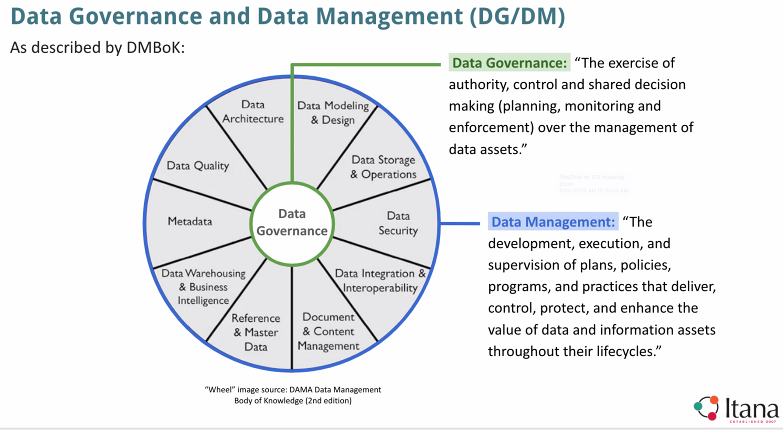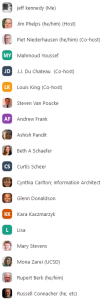Page History
...
- 27 May 2022
- J.J. Du Chateau, University of Wisconsin-Madison
- Louis King, Yale University
- Piet Niederhausen, University of Washington
- Slides > Presentation Deck <
Context
- DAMA Framework provides a useful frame of reference, separating data governance and data management like this:
- One challenge at our institutions is that data governance tends to come in after all the other behaviors in the DAMA wheel are already underway everywhere.
- Another challenge is that higher-education institutions are very distributed in terms of accountability and organizational structure and domain, illustrated in this diagram from Louis King:
- As architects, how we engage with this space requires us to be aware of complexity of these activities in our institutions — this constitutes a "wicked problem", a problem that is difficult of impossible to solve because of incomplete, contradictory, and changing requirements that are often difficult to recognize. There are both complicated and complex aspects of data governance and data management. The nature of this demands an evolutionary/iterative approach to data governance and data management (particularly in large and complex organizations).
- Although this is wicked for all of its complication and complexity, we can "chunk" our approaches using the DAMA framework above and by navigating the overall space in partitions (e.g., by organizational unit or data domain).
- Architecture is a practice that can apply a design mindset (and enterprise architecture takes an organizationally-holistic approach) and can work iteratively, and the role of architecture isn't so much in question here as at the very core of what our practices must do and lead and influence.
- Our responses will be different in one architecture domain (e.g., technical architecture = identifying capabilities in the underling IT solutions) than another (e.g., business architecture = understanding which business capabilities are implicated in a certain data-governance-and-data-management "slice").
...
- Slide Pack = https://docs.google.com/presentation/d/1QbtB3izAlDIRaUBIF4xAQ_4BK4a3Lcx4F90R6DqeawM/edit#slide=id.g12efb7c4d3b_0_105
- Higher Education Reference Models for business capability map and data reference model = https://library.educause.edu/resources/2021/9/the-higher-education-reference-models
Participants
ZOOM Chat
06:03:38 From Curtis Scheer to Everyone:
Welcome to the call. I'm new to EA as well same situation new to me and new to my organization
06:07:20 From J.J. Du Chateau to Everyone:
Did I move Piet? :)
06:07:52 From Curtis Scheer to Everyone:
can we have a link to the slide deck?
06:08:11 From Louis King to Everyone:
https://docs.google.com/presentation/d/1QbtB3izAlDIRaUBIF4xAQ_4BK4a3Lcx4F90R6DqeawM/edit#slide=id.g12e760a3d0a_1_97
06:08:22 From Curtis Scheer to Everyone:
Thanks!
06:08:38 From J.J. Du Chateau to Everyone:
Links and meeting notes will also by on Itana.org at some point in the near future.
06:13:55 From Mary Stevens to Everyone:
Does wicked align with the Cynefin idea of complex?
06:14:10 From Piet Niederhausen to Everyone:
Complex or possibly even chaotic ... your choice : )
06:17:36 From Jim Phelps to Everyone:
I think another lens that architects bring is the Customer Experience / Journey lens. We can talk about what is it like for institutional reporting, integrators, etc when they want to get access to data
06:18:25 From jeff kennedy to Everyone:
...and Information Architecture?
06:18:36 From Piet Niederhausen to Everyone:
Both great analytical approaches to bring to DG/DM!
06:21:21 From J.J. Du Chateau to Everyone:
Yes Jeff, Other arch types are what we'd like to hear example about too.
06:25:52 From Curtis Scheer to Everyone:
Here is a great graphic along those lines - https://www.leanix.net/hubfs/Blog/enterprise%20architect%20vs%20solution%20architect%20vs%20technical%20architect.png
06:33:21 From Louis King to Everyone:
Mahmoud, I totally agree in regard to the provenance.
06:47:29 From Mary Stevens to Everyone:
+1 to JJ, it may not exist now.
06:54:49 From Curtis Scheer to Everyone:
i would add to that in addition to having access we are also working towards data democratization
06:56:38 From Louis King to Everyone:
Curtis, interesting, we helped establish an open access policy to Yale’s cultural heritage content in the public domain. It was a powerful paradigm switch.
07:00:42 From Russell Connacher to Everyone:
Great discussion all.
07:00:50 From Russell Connacher to Everyone:
I need to drop off
07:01:18 From Andrew Frank to Everyone:
I need to drop as well, this was a lot of fun - thanks everyone
07:01:34 From Ashish Pandit to Everyone:
Need to drop off. Thank you
07:02:00 From Lisa to Everyone:
thanks for letting me join in, amazing discussion!
07:02:11 From Louis King to Everyone:
Thanks Piet. That was great!
07:02:20 From Louis King to Everyone:
Thanks JJ.



